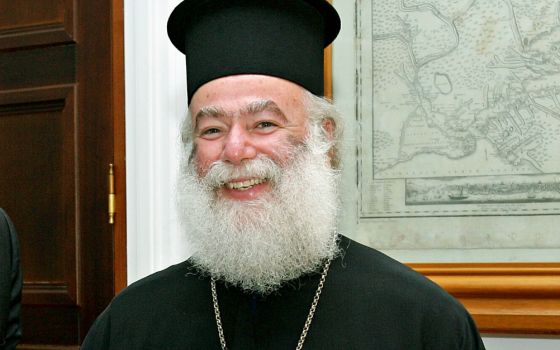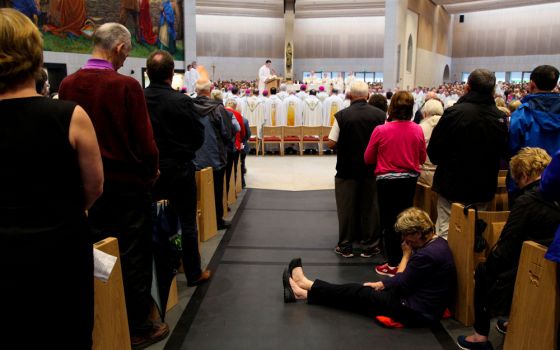The good news: Kilmore, Ireland, Bishop Leo O'Reilly wants the Irish bishops' conference to study women deacons. The bad news: The news reports misrepresent the latest Vatican statement on women deacons.
Whatever will we do about the folks who fall down in a dead faint whenever you say "woman" and "ordination" in the same sentence?
To begin: A Catholic News Service article by Irish Catholic editor Michael Kelly changes facts. Kelly says it's a dead idea: No women deacons. He writes: "The permanent diaconate belongs to the sacrament of orders, which the church believes is limited to men alone."
Correction: The church teaches that priestly ordination is reserved to men alone. There is no magisterial statement about women as deacons.
In fact, the conclusion to a 2002 study document by the International Theological Commission (ITC) states quite plainly that 1) ancient deaconesses were not the same as ancient deacons; 2) diaconal and priestly ministries are different; and 3) the question of women deacons is for the ministry of discernment that Christ left to his church to "pronounce authoritatively on this question."
Discernment about readmitting women to the ordained diaconate -- along with talking about the celibate male priesthood -- is precisely what good Bishop O'Reilly is asking for.
So, women deacons? Married priests?
A while back, Pope Francis said he would receive requests from bishops' conferences to ordain married men as priests. There are already exceptions to the rule around the world: Married Anglican and Protestant ministers who become Catholic have been ordained as Catholic priests. While many Anglicans and Protestants regard the practice as shepherd-stealing, it is quite clear that at least some married men may be ordained as Catholic priests now and in the future.
Which married men? If the rules change, the diocesan ordinary might look toward his deacons -- predominantly married men with seminary training and experience in ministry. That would be a short-sighted solution to the priest shortage and one that would weaken the diaconate.
The diaconate and the presbyterate are separate and distinct orders. The early church had deacons as the principal assistants to the bishops. The deacon, not the priest, was in line to be the next bishop.
What about the women? Women deacons ministered to women in baptism, catechesis, spiritual direction and extreme unction. Liturgies show that men and women were ordained as deacons by the bishop inside the sanctuary with identical ceremonies.
But the 2002 rewrite of a 1997 ITC document lost much historical fact and nuance. It did, however, gain several paragraphs from a previously published book by Gerhard L. Müller, now cardinal-prefect of the Congregation for the Doctrine of the Faith and editor of the complete works of Joseph Ratzinger.
Reportedly, the 1997 ITC document said OK to women deacons, but Ratzinger, then prefect of the doctrinal congregation, refused to sign it. Ratzinger replaced the entire subcommittee, excepting one of his former graduate students who became its chair. He also named Müller to the subcommittee.
In five years, the 1997 document's 17 or 18 positive pages quadrupled. The 2002 document used 336 footnotes to argue -- relatively unsuccessfully -- against women deacons.
Why? Probably because the writers could not figure out how women deacons did not imply women priests. That is key to the discussion, in Ireland or anywhere else. But the ordained deacon is not necessarily on the path to priesthood. The ordained deacon -- the church now calls 42,000 men "permanent deacons" -- is just that: a deacon.
The people of God seem to understand that fact. And if a permanent male deacon is not on the path to priesthood, neither would be a permanent woman deacon.
The church needs to talk about its ministry. The Kilmore diocese had a 10-month "listening process" that resulted in a diocesan assembly, a new pastoral plan, and O'Reilly's proposal to the Irish bishops' conference. Other dioceses -- and bishops' conferences -- must do the same.
What will the Irish bishops talk about? All heck broke loose last fall, when another Irish bishop, Kieran O'Reilly, then of Killaloe and now of Cashel and Emily, invited men (only) to apply for the diaconate. In short order, the women of Killaloe let him know in no uncertain terms that they -- not some male deacons at the end of the rainbow -- were already doing diaconal ministry. He canceled his plan and ended up getting promoted.
The two O'Reilly bishops are not related, but each has worked in the missions and each has been a seminary professor in Nigeria. They know the needs for ministry. One saw the way his local church reacted to the male-only diaconate. The other also got the message loud and clear from the people of his diocese, and he plans to act.
Will the Irish church lead the way? In the early church, ordained women deacons -- not unordained deaconesses -- extended the bishop's ministry to women and children. Who does that now? Who will do it in the future?
[Phyllis Zagano is senior research associate-in-residence at Hofstra University in Hempstead, N.Y. She will speak Sept. 19 in Philadelphia. Her newest books include Mysticism and the Spiritual Quest: A Crosscultural Anthology and Women in Ministry: Emerging Questions about the Diaconate.]
Editor's note: We can send you an email alert every time Phyllis Zagano's column, Just Catholic, is posted. Go to this page and follow directions: Email alert sign-up.


